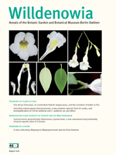
Willdenowia
Scope & Guideline
Connecting researchers to the heart of botanical science.
Introduction
Aims and Scopes
- Plant Taxonomy and Systematics:
The journal emphasizes rigorous taxonomic studies, including the description of new species, revisions of existing taxa, and the establishment of new genera, contributing to the classification and understanding of plant diversity. - Phylogenetic and Biogeographical Research:
Willdenowia publishes studies that explore the evolutionary relationships among plant species, utilizing molecular and morphological data to elucidate phylogenetic trees and biogeographical patterns. - Flora and Vegetation Studies:
Research on regional floras and vegetation types is a core area, with publications detailing the diversity, distribution, and conservation status of plant species in various geographical contexts. - Conservation and Ecological Insights:
The journal also engages with conservation biology by addressing ecological aspects of plant species and their habitats, highlighting the importance of biodiversity preservation. - Historical and Cultural Perspectives in Botany:
Unique contributions include historical analyses of botanical exploration and cultural interactions with plants, providing context to contemporary botanical science.
Trending and Emerging
- Molecular Phylogenetics and Genomics:
There is a growing emphasis on molecular phylogenetics, where studies utilize genetic data to resolve taxonomic ambiguities and clarify evolutionary relationships, underscoring the importance of genetic tools in modern botanical research. - Conservation Genetics and Ecology:
Research focusing on conservation genetics has gained traction, highlighting the genetic diversity of endangered species and the implications for conservation strategies, responding to global biodiversity loss. - Impact of Climate Change on Flora:
An emerging theme is the investigation of climate change effects on plant distributions and phenology, which is critical for understanding and mitigating the impacts of environmental changes on biodiversity. - Collaborative and Interdisciplinary Research:
There is an increasing trend towards collaborative studies that integrate data across multiple disciplines, including ecology, genetics, and geography, fostering a more holistic understanding of plant science. - Regional and Global Biodiversity Assessments:
The journal is seeing a rise in publications that contribute to large-scale biodiversity assessments, addressing global patterns of plant diversity and informing conservation priorities.
Declining or Waning
- Morphological Studies without Molecular Context:
There has been a noticeable decrease in purely morphological studies that do not incorporate molecular data, as the field increasingly favors integrative approaches that combine both morphological and genetic information. - General Floristic Surveys:
General floristic surveys that provide broad overviews of plant diversity in certain regions are becoming less common, possibly as researchers shift towards more targeted studies that address specific ecological or conservation issues. - Historical Botanical Collections:
Research focused on historical botanical collections and their implications has waned, indicating a possible decline in interest in the historical context of botanical studies in favor of contemporary applications. - Traditional Ethnobotanical Studies:
There appears to be a diminishing trend in traditional ethnobotanical studies, which may be overshadowed by more quantitative ecological and conservation-focused research.
Similar Journals
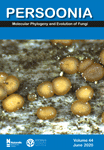
PERSOONIA
Illuminating the Path of Ecological DiscoveryPERSOONIA, a distinguished journal published by RIJKSHERBARIUM, serves as a pivotal platform for the dissemination of high-quality research in the fields of Ecology, Evolution, Behavior, and Systematics, as well as Plant Science. Established with a commitment to advancing scientific knowledge, PERSOONIA has achieved an impressive Q1 ranking in these areas, highlighting its significant impact within the academic community, as evidenced by its ranking of #12 out of 721 journals in its field, placing it in the top 2% of publications. With a publication history that spans from 1996 to present, the journal regularly features innovative studies that push the boundaries of understanding in ecological and botanical sciences. While Open Access options are currently limited, researchers and professionals alike benefit from subscription access to this vital resource. Located in the Netherlands, PERSOONIA continues to be a beacon for scholars aiming to enrich the discourse in evolving ecological and plant science disciplines.
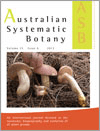
AUSTRALIAN SYSTEMATIC BOTANY
Connecting Research with Australia’s Unique FloraAustralian Systematic Botany is a prestigious academic journal dedicated to the field of plant science, published by CSIRO PUBLISHING. Established in 1988, this journal has become a vital resource for researchers, professionals, and students focusing on the systematic study of Australian flora. With an impressive track record and convergence extending to 2024, it operates in the Q3 category for Ecology, Evolution, Behavior and Systematics and Q2 for Plant Science as of 2023. The journal holds significant value in the academic community, given its Scopus ranking, which places it in the 61st and 59th percentiles within its respective categories. Although it follows a subscription-based model, the journal remains committed to advancing knowledge in systematic botany, offering critical insights that shape the future of ecological and biological research both in Australia and globally.

NEW ZEALAND JOURNAL OF BOTANY
Illuminating the Intersection of Ecology and EvolutionThe New Zealand Journal of Botany, published by the esteemed Taylor & Francis Ltd, serves as a pivotal platform for disseminating significant research in the fields of Ecology, Evolution, Behavior and Systematics, as well as Plant Science. With a rich history dating back to 1963 and an impressive convergence extending to 2024, this journal has established itself as an essential resource for researchers and professionals dedicated to understanding the complexities of plant life and ecological systems in New Zealand and beyond. The journal is currently categorized in the Q3 quartile for both relevant disciplines as of 2023, reflecting its balanced influence within the global academic community. Although not an open access journal, it retains a significant impact factor, evidenced by its Scopus rankings, which place it within the top half of its categories. This makes it an invaluable tool for students, researchers, and academics aiming to engage with robust, peer-reviewed scientific findings and contribute to the evolving discourse surrounding botany and ecological research.

BRITTONIA
Connecting Researchers Through Plant Science InsightsBRITTONIA, published by Springer, stands as a reputable journal dedicated to advancing the fields of botany and plant sciences. With a storied history dating back to 1931, this journal has evolved to embrace contemporary research spanning various aspects of plant biology, ecology, and systematics. Focusing on a comprehensive analysis of both ecological interactions and plant systematics, BRITTONIA plays a crucial role in disseminating knowledge among researchers and professionals committed to understanding plant life and its environmental contexts. Despite its open access status being currently unavailable, the journal ensures wide accessibility through institutional subscriptions. In the latest rankings, it proudly holds a Q2 category in Plant Science and a Q3 category in Ecology, Evolution, Behavior, and Systematics, indicating its growing influence and academic rigor. Researchers and students alike will find BRITTONIA an essential resource for the latest findings and discussions in plant sciences.
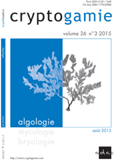
CRYPTOGAMIE ALGOLOGIE
Innovating Research at the Crossroads of Ecology and EvolutionCRYPTOGAMIE ALGOLOGIE, with ISSN 0181-1568 and E-ISSN 1776-0984, is a prominent scholarly journal published by ADAC-CRYPTOGAMIE in France, focusing on the intricate intersection of aquatic sciences, ecology, evolution, and plant sciences. Established in 1990, this journal serves as a vital platform for researchers, professionals, and students alike, fostering the dissemination of innovative research and comprehensive reviews in its field. With a Q3 ranking in Aquatic Science, Ecology, Evolution, Behavior and Systematics, and Plant Science for 2023, CRYPTOGAMIE ALGOLOGIE stands out for its contributions to understanding cryptogams' ecological significance and their evolutionary adaptations. The journal is indexed in Scopus, reflecting its impact and relevance in the scientific community, with particular strengths highlighted by ranks in various categories. As an engaging resource for those involved in aquatic ecosystems and plant ecology, CRYPTOGAMIE ALGOLOGIE invites submissions that push the boundaries of knowledge in these crucial fields, ensuring methodologies and findings are accessible and impactful for future research.

TAXON
Advancing the frontiers of biodiversity research.TAXON is a premier international journal published by Wiley, dedicated to the fields of ecology, evolution, behavior, systematics, and plant science. With a distinguished history since 1970 and a commitment to advancing knowledge in the biological sciences, TAXON has been recognized in the Q1 category for both its ecological and plant science contributions as of 2023. The journal boasts an impressive Scopus ranking, placing it in the 76th percentile for Ecology, Evolution, Behavior and Systematics and the 74th percentile for Plant Science, highlighting its significance and impact within these domains. While not an open-access publication, TAXON offers a wealth of high-quality research articles, reviews, and discussions, making it an indispensable resource for researchers, professionals, and students alike seeking to deepen their understanding of biodiversity and systematics. For access to its cutting-edge research, readers can follow the journal's updates and contributions online.

PLANT SYSTEMATICS AND EVOLUTION
Transforming Understanding of Plant LineagesPlant Systematics and Evolution is a prestigious journal published by Springer Wien, dedicated to advancing research within the fields of plant taxonomy, evolution, and ecology. With its ISSN 0378-2697 and E-ISSN 1615-6110, this journal has been pivotal in shaping the scientific landscape since its inception in 1974. Based in Austria, it occupies a significant position in the academic community, being ranked in the Q2 quartile in both Ecology, Evolution, Behavior and Systematics and Plant Science as of 2023. This high-impact journal is recognized for its rigorous peer-review process and is indexed among the top publications in its category, holding a Scopus rank of #176 out of 516 in Plant Science and #252 out of 721 in Ecology, highlighting its relevance and quality in the research community. Although it does not currently offer open access, the journal is committed to making significant contributions to the understanding of plant biodiversity and evolutionary processes. This makes it an essential resource for researchers, professionals, and students aiming to know the latest developments in the study of plant systematics and evolution.

Mediterranean Botany
Championing Open Access for Global Botanical DiscoveriesMediterranean Botany is a distinguished peer-reviewed journal dedicated to the flourishing fields of Ecology, Plant Science, and Ecology, Evolution, Behavior and Systematics. Published by the Universidad Complutense de Madrid, Servicio Publicaciones, this Open Access journal has been disseminating valuable research since 2018, ensuring that findings are accessible to a global audience, with an emphasis on Mediterranean vegetation and biodiversity. With an ISSN of 2603-9109, it contributes significantly to the academic discourse in its category quartiles, recently featuring in Q3 for Ecology and related fields. Notably, Mediterranean Botany ranks within the top half of its category in Scopus, highlighting its relevance and contribution to the scientific community. Researchers, professionals, and students alike will find the journal to be a vital resource for latest discoveries, trends, and conservation strategies in Mediterranean ecosystems, positioning it as an essential platform for advancing knowledge and fostering collaboration within the plant sciences.
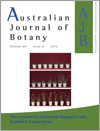
AUSTRALIAN JOURNAL OF BOTANY
Exploring the richness of Australian flora and ecology.The Australian Journal of Botany is a prestigious peer-reviewed journal published by CSIRO PUBLISHING, dedicated to advancing the field of plant sciences and ecology. Established in 1953, this journal provides a critical platform for researchers to share original research findings, reviews, and perspectives in subjects ranging from plant biology to ecological interactions, with a focus on Australian flora and its conservation. With an impressive impact factor and categorized in the Q3 quartile in both Ecology, Evolution, Behavior and Systematics and Plant Science, the journal ranks competitively within its fields, allowing authors to reach a diverse audience of professionals, students, and fellow researchers. The journal is accessible in print and electronically through its ISSN: 0067-1924 and E-ISSN: 1444-9862, providing wider access to vital research outcomes that influence environmental policies and natural resource management. As it aspires towards innovation and excellence, the Australian Journal of Botany remains an essential resource for those passionate about the richness of plant biodiversity and ecological understanding.
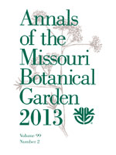
ANNALS OF THE MISSOURI BOTANICAL GARDEN
Elevating the Study of Plants and Their EnvironmentsANNALS OF THE MISSOURI BOTANICAL GARDEN is a prestigious, peer-reviewed journal published by the Missouri Botanical Garden, focusing on the rich disciplines of Ecology, Evolution, Behavior, and Plant Science. With a storied history dating back to 1946, this journal has evolved to become a significant platform for scholars and professionals to disseminate research that informs global understanding of plant biology and conservation. Ranked in the Q2 category for both Ecology and Plant Science in 2023, it boasts commendable standings within the Scopus rankings, placing it in the 66th percentile for Plant Science and the 65th percentile for Ecology, Evolution, Behavior, and Systematics. The journal's commitment to rigorous scientific standards ensures that it remains a vital resource for those seeking to explore vital ecological and botanical research. As a product of the esteemed Missouri Botanical Garden, the journal serves researchers, professionals, and students alike, encouraging collaboration and innovation in the plant sciences community.